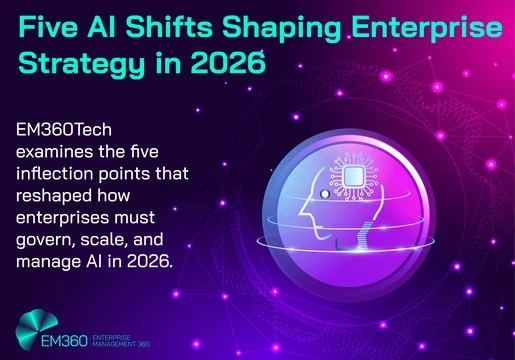Artificial Intelligence (AI) has been predicted to bring the greatest technological changes in our lives. Together with the Internet of Things (IoT), blockchain, and many more, AI is considered to be the most disruptive technology and has influenced numerous sectors, such as healthcare, business, agriculture, education, and urban development.
Emerging technologies have driven innovation and progress in today's rapidly evolving digital landscape. From machine learning and artificial intelligence to blockchain and the Internet of Things, these technologies are reshaping industries across the globe. Businesses can gain a competitive edge and position themselves for long-term success by staying informed and adopting emerging technologies.
Innovation in Blockchain, artificial intelligence (AI), and the Internet of Things (IoT) speak to a unique opportunity for the public domain and organizations. All these technologies play a significant role in the development of Industry.
The statistic shows a prediction of the economic influence of disruptive technologies in 2025 by technology type, with both a high and low estimate. The Internet of Things is predicted to have an annual economic impact of up to 11.1 trillion dollars by 2025.

Understanding Disruptive Technologies
A simple definition of disruptive technology is an innovation that has a significant impact on the way consumers, businesses, or industries operate daily. Because of its superior attributes a disruptive innovation replaces existing models. However, it is crucial to note that in some cases, disruptive technologies do not completely eradicate the technologies they are replacing.
An innovation that significantly alters the way that consumers, industries, or businesses operate is disruptive technology. Disruptive technology takes away the systems or processes it replaces them because it has distinctly superior attributes.
Artificial Intelligence
AI is a significant factor in disruptive innovation that leads to game-changing products and services able to serve low-end or unserved consumers and migrate to the mainstream market. This technology is a driving force behind the disruptive breakthrough we are currently seeing. For instance, the AI-enabled sharing economy is a new business model where individuals can share their assets with others as services to make better use of these assets and generate profit.
Blockchain
Bitcoin and cryptocurrency are examples of currencies that are exchanged in digital ledger transactions through what is called a blockchain service. While this process is still developing and hasn’t quite reached the general public yet, it’s considered a disruptive technology that is altering the e-commerce sector. It’s significant because it allows a cashless policy that will change how we exchange money.
Internet of Things (IoT)
Technology has progressed so quickly that various devices can communicate with one another in intricate ways. The variety of applications has resulted in all sorts of software, hardware, and technology able to handle a variety of objectives – but, additionally, these can work together to achieve objectives that you would not be able to use with just one device. This is where the concept of the Internet of Things (IoT) comes in.
Disruptive Technologies Impact on Businesses
Disruptive technologies have a very deep impact on the industrial front, from individuals and overall society as a whole. These are crucial key points to note.
- It can transform the industrial landscape by introducing new models for running a business, encouraging competition, and bringing a revolution to the entire process of manufacturing, delivering, and consuming goods and services.
- It creates new possibilities for innovation in various fields, be it transportation, healthcare, or communication.
- The job environment can be replaced with something better, easy to handle and perform, or converted manually to an automated process. Using the latest technology new job creation takes place with proper upskilling.
- It leads to the replacement of old services and products with updated ones that are more user-friendly.
- Economic growth is accelerated, creating new entrepreneurial initiatives, leading to job opportunities and industrial development. It creates new possibilities for growth and expansion.
- This technology gives access to better information, upgradation in the field of education and services by creating better learning platforms and content, and opportunities to reach areas of places that are remote and not easily accessible.
- It also helps create customized and useful solutions of products and services for people that can cater to their needs better. This also helps in getting to a huge number of customers, it helps in increasing the customer base for higher sales and income generation.
- Disruptive technology in the healthcare industry benefits a lot from such development in technology because of improvements in methods of diagnosis and treatment.
- Social media, communication, international trade, etc get a big boost. It becomes easy for people to connect from far-off places, share information, and exchange culture globally within a short period.
- However, security and privacy are a significant concern in this field. Technology advancement also gives a boost to cybersecurity threats and unauthorized use and access to private and sensitive information.
However, the influence may be either beneficial bad, or both, depending on the kind of change in technology, how quickly it is accepted, and regulatory requirements.
Disruptive Technologies Benefits on Businesses
Increased Efficiency: Efficiency is key when it comes to managing a business. In today’s fast-paced market, Efficiency in a company's operation will result in more competition. That’s where artificial intelligence comes in.
One of the most significant aspects of Artificial intelligence in business is its ability to streamline processes and automate routine tasks. For example, with AI-powered chatbots handling customer service inquiries, human agents can focus on more complicated issues and provide a better customer experience.
Better Decision-Making: Huge amounts of data can be processed and analyzed by AI systems in real-time, providing companies with valuable insights that can lead to continuous improvements in efficiency. It’s a huge factor for businesses looking to stay ahead of the curve.
Analyzing data from various sources, identifying trends, making predictions, and providing valuable insights can be done by AI systems to inform decision-making. Unfortunately, humans can only perform this kind of data processing for a limited amount of time.
Enhanced Productivity: The project management field is another area where AI can enhance productivity. Workflows, identifying bottlenecks, and providing real-time insights into project progress can be optimized by AI-powered project management systems. Driving productivity to new levels, this automation and data analysis level can help teams complete projects faster and more efficiently.
Potential for Growth: Embracing disruptive technology opens the way for growth either within a business' current industry or within a new initiative created by the technology.
Helping companies transition current customers into using it while quickly and easily attracting new customers through their entry into a fresh market, using disruptive technology smoothly within an existing product and service lines
Businesses that are open to new ideas and innovations are open to future possibilities that do not exist yet.
Leverage Technology: It is common for business owners to identify gaps left by industry leaders and use technology to create solutions to fill them.
Apps providing convenience, new devices using Virtual Reality / Augmented Reality technology, and improved systems such as blockchain technology are examples of disruptive technologies that companies can leverage for their benefit.
Technological advancements will continue to create world-changing disruptions quickly as technology makes exponential growth. Businesses must face disruptions head-on and leverage the disruption to implement new techniques and procedures that disruption demands or they risk falling behind.
Conclusion
Disruptive technology is more than just innovation in the modern economy. It’s a chance to outperform the existing completion and get better. Accepting disruption empowers business establishments to overcome the potential risks and to stay afloat in the competitive environment.
To develop, businesses everywhere must embrace the culture of investing in disruptive innovations. The role of business leaders is quite crucial. They have to update their organizational strategies in the face of continuously evolving technologies.







Comments ( 0 )